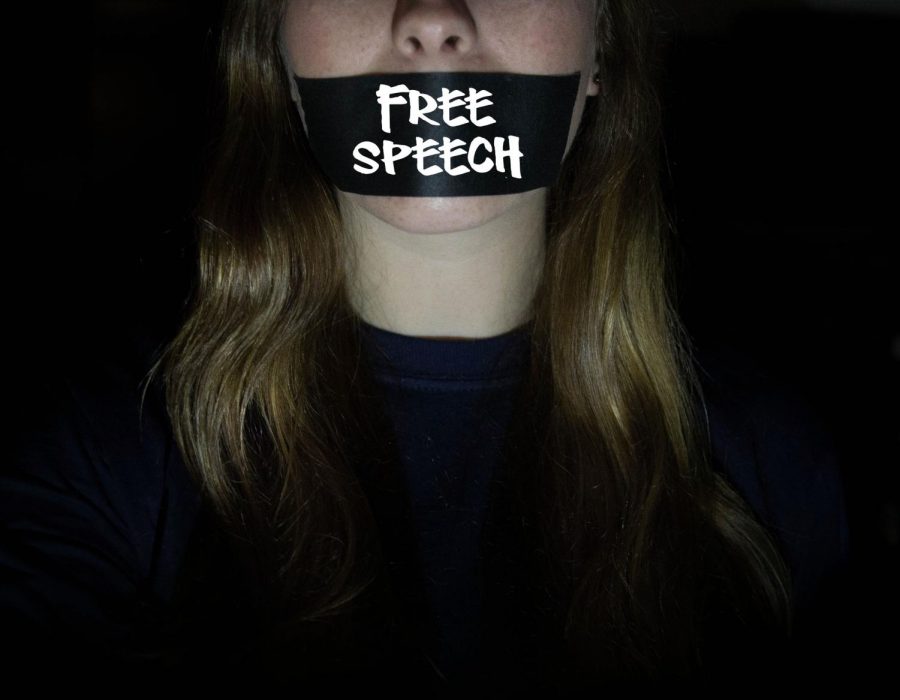New UNI policy protects hate speech
Staff writer Caleb Stekl pens a column discussing UNI’s recently announced “Freedom of Expression Policy,” which he says protects hate speech.
Feb 15, 2018
UNI is considering enacting a new “Freedom of Expression Policy,” according to an email sent out by administration officials.
Here’s why it sucks.
The policy states, “we do not limit the exchange of ideas — even ideas that some may consider offensive, disagreeable, hurtful or even hateful — so long as all individuals comply with campus policies and procedures.”
Policies such as this have long protected the expression of fringe political viewpoints.
Perhaps the greatest test of free speech was during the so called “Red Scares” of the early 20th century, following World Wars One and Two. The Supreme Court held it was legal to express communist and socialist viewpoints, provided that their expression did not incite harm or violence.
Our country’s unique conception of free speech rights views the government as an objective judge which should protect all speech, no matter how virulent and offensive. Any attempt at suppressing most forms of speech is branded as government censorship, a personal attack on our individual rights.
Yet, for most of our country’s history, the right to speak has not been a universal right. Even today, minority voices are silenced because of discrimination, unequal access to education and dismissal of minority viewpoints.
Free speech fails to protect minorities.
Whites’ vigorous defense of free speech, and our attempt to downplay the costs associated with offensive speech, can be explained by the fact that we are so rarely the targets of it.
The white majority has never been targeted by terrorist groups attempting to make us fearful to practice our religion or our ability to participate in democracy.
There is no incentive to provide legal protection to minorities from hate speech; many minorities pose little threat to an elected official’s prospects of reelection. We feel no need to give up our privileged position as a people that is both excluded from hate speech and purveyors of it.
Free speech has the possibility to protect minority viewpoints and challenge dogma, but more importantly, it has the power to harm the physical and emotional well-being of minorities.
A common argument advanced for free speech absolutism is that we will suffer from ideological silo. Silo occurs when people are not exposed to different concepts and their worldviews are untested; their ideology becomes dogmatic.
Just as Socrates tried to keep Athens on its intellectual toes, free speech defenders view Nazis as our ideological gadfly.
Except, everyone lives in their own silo. We cannot be exposed to all ideas and all forms of speech. There are unlimited normative economic arguments, but we can only hope to explore a small fraction of them.
We live in silos defined by our class, gender and race. As a white, straight, male, agnostic individual, I will never be exposed to the smallest fraction of offensive speech. I cannot ethically argue for absolutist speech because I will never experience the negative effects of it.
The positive argument for absolutism can only be understood from the protective sphere of whiteness.
Whites live in a perpetual state of protected ideological and physical silo. We have the privilege to expose ourselves and our ideas to peer criticism without fearing our bodies will be subject to verbal or physical attack.
We can freely and confidently interact with the marketplace of ideas (a flawed concept in itself) and not fear reprisal or retribution for our arguments. We need only fear our dogmas being exposed.
White silo protects us from speech attacking the fundamental nature of our existence.
There are few ideologies calling for the elimination or subjugation of our race. We are not forced to hear a wig-wearing cheeto call us rapists and murders.
There has never existed a group presenting a serious threat to our existence. For non-whites, this has been the status-quo for 400 years. Power never gives up its position voluntarily.
Offensive speech should not be protected. Furthermore, ideologies that attack the fundamental beings of people should not be protected.
Ideologies specifically for the subjugation of individuals for characteristics that are intrinsic in their existence cannot hold equal protected status under the law to normative economic theories. Worse, if opinions such as this are allowed to flourish, they have the serious potential to become mainstream.
Free speech questions have resurfaced as our Dotard in Chief continues to berate brown and dark-skinned minorities.
According to the Southern Poverty Law Center, there were 757 hate-speech incidents in the first 34 days following Trump’s election that were directed at immigrants, black and African-Americans, LGBT* individuals and Muslims.
The violence at Charlottesville was only allowed to occur because the city council approved a protest permit. The striking image of a black police officer being ordered to protect fascists should abhor the senses.
But free speech, they say.
Challenging our intellectual perceptions is perhaps the most important function of attending university. But hate speech inhibits this function. It creates a hostile environment that can substantially disrupt the ability of students to attend class and grow intellectually.
UNI’s free speech policy protects hate speech at the expense of student safety and well-being.
The policy is listed on UNI’s website and is open to comment through Feb. 15.








